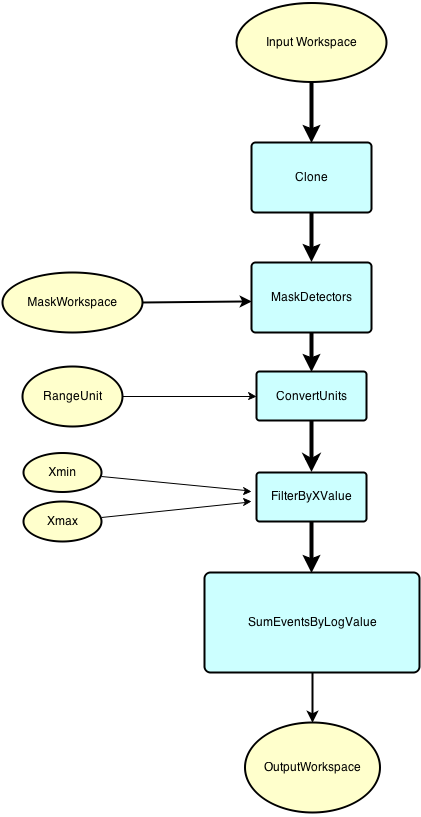Table of Contents
| Name | Direction | Type | Default | Description |
|---|---|---|---|---|
| InputWorkspace | Input | EventWorkspace | Mandatory | The input workspace. Must hold ‘raw’ (unweighted) events. |
| OutputWorkspace | Output | TableWorkspace | Mandatory | The output table workspace. |
| MaskWorkspace | Input | MatrixWorkspace | A workspace holding pixels to be masked. | |
| XMin | Input | number | Optional | The minimum value of X for which an event will be counted. |
| XMax | Input | number | Optional | The maximum value of X for which an event will be counted. Must be greater than XMin. |
| RangeUnit | Input | string | TOF | The units in which XMin and XMax is being given. Allowed values: [‘Degrees’, ‘DeltaE’, ‘DeltaE_inFrequency’, ‘DeltaE_inWavenumber’, ‘dSpacing’, ‘dSpacingPerpendicular’, ‘Empty’, ‘Energy’, ‘Energy_inWavenumber’, ‘Label’, ‘Momentum’, ‘MomentumTransfer’, ‘QSquared’, ‘SpinEchoLength’, ‘SpinEchoTime’, ‘Time’, ‘TOF’, ‘Wavelength’] |
This algorithm is for producing rocking curves from alignment scan runs. It is for use only with ADARA-style SNS datasets as it requires the ‘scan_index’ log variable. The algorithm optionally uses the MaskDetectors v1 and/or FilterByXValue v1 algorithms to restrict the region of data included. N.B. If these options are used, then this algorithm will modify the input workspace.
The SumEventsByLogValue v1 algorithm is then called, with ‘scan_index’ as the log to sum against. The row of the resulting table pertaining to scan_index=0 (which indicates ‘not a scan point’) is then removed.
Before then it will call other algorithms as shown in the flowchart, if the relevent inputs have been set. MaskDetectors v1 will be called if a MaskWorkspace is supplied. If either Xmin or Xmax or both are supplied, then FilterByXValue v1 algorithm is run to restrict the region of data included and if RangeUnit is not TOF, ConvertUnits v1 is run beforehand.
If necessary, the imput workspace is cloned, to save it from being modified.

Categories: Algorithms | Workflow\Alignment
C++ source: StepScan.cpp (last modified: 2018-03-07)
C++ header: StepScan.h (last modified: 2018-03-07)
Python: StepScan.py (last modified: 2018-03-07)